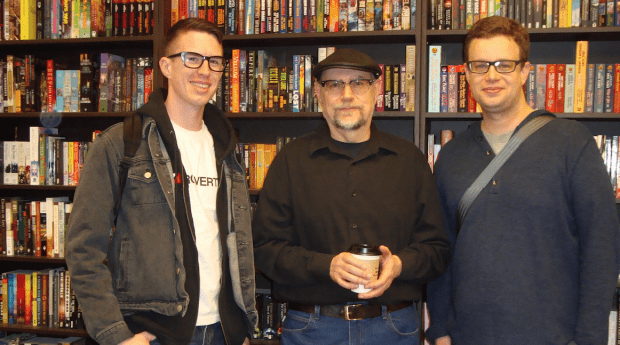A fan once rebuked Hugo Award-winning author Robert Charles Wilson because of a gay character in his 2006 novel Julian Comstock: A Story of 22nd-Century America.
“I had this long email exchange with somebody after I wrote it,” the science-fiction writer says. “It was a guy who loved the book, but he wrote to me because he was a little upset about the gay content. He thought it was too coy.”
Wilson recalls that the fan said something like, “I don’t see myself represented in books very often, and it was nice to be almost represented in this one.”
Of course, that’s the nature of Julian Comstock — it was written in the style of a 19th-century moralistic children’s book, so the coyness is a given. However, the man’s comment stuck with Wilson — that snide “almost.”
“I felt duly chastened,” he says. “I thought, ‘yes, I need to pay attention to this a little bit.’ And maybe some of that was in the back of my mind when I wrote The Affinities.”
Released in April 2015, The Affinities is arguably Wilson’s gayest novel yet.
In the very near future, individuals who undergo InterAlia’s testing could win placement by the corporation in one of 22 Affinities. Based on a science called social teleodynamics, Affinities are groups of dissimilar people who complement each other extraordinarily well, resulting in almost perfect cooperation. And with better cooperation comes greater power.
Connections with members of your own Affinity are so strong, members abandon most non-Affinity relationships, including family.
In Toronto, Adam Fisk, a graphic design student at Sheridan College, endures the battery of tests and is placed in an Affinity called Tau. He gets his first taste of the power of the Affinities when, on the first night he meets the local division (or “tranche”) of his Affinity, his tranchemates set him up with a place to live and a job in his field.
Fisk isn’t gay, but the book presents him as the next best thing. Growing up sports-averse and bookish means that in the mind of his right-wing, bigoted father, he might as well be gay.
He also finds himself surrounded by gayness. His new living quarters are in the posh Rosedale home of a lesbian couple — a particularly accommodating pair of tranchemates.
Their sexual orientation is mentioned without hoopla, without conflict — it’s just part of who they are. The same goes for the story’s treatment of Trevor, the very un-stereotypically kind, forthright and tough gay man who becomes one of Fisk’s closest Tau friends.
It’s no wonder so many of Fisk’s friends aren’t straight — out of the 22 Affinities, Tau has the highest proportion of pot smokers and homosexuals. That’s because if Wilson were in an Affinity, that’s how he’d like it to be.
“I don’t think the book works unless [the reader] can appreciate the value Adam finds in his Affinity,” he says. “So all I could do was design a group that I thought would be a really great place to be.”
Members of particular Affinities may cooperate wonderfully well with each other, but this doesn’t extend to their relations with the outside world. As the years pass and the Affinities grow in size and power — Tau has its own investment firm, hospitals and, out of grim necessity, security force — they become less respectful of society’s rules and of outsiders. They begin to butt heads with governments and with other — now rival — Affinities.
What begins as an idealistic grasping at a — fairly gay, as it turns out — vision of Utopia becomes a deadly battle with so much resting on the actions of Tau’s top diplomat, Adam Fisk.
The Affinities is available wherever you like to buy books.


 Why you can trust Xtra
Why you can trust Xtra


